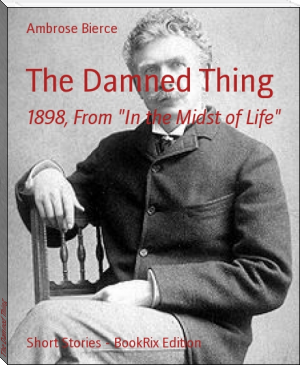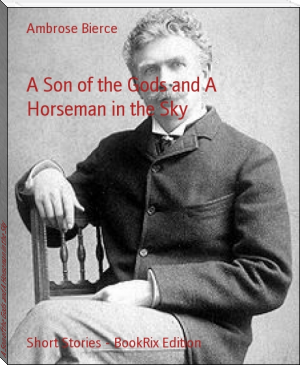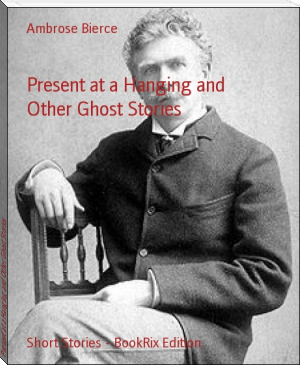Can Such Things Be? - Ambrose Bierce (thriller novels to read TXT) 📗

- Author: Ambrose Bierce
Book online «Can Such Things Be? - Ambrose Bierce (thriller novels to read TXT) 📗». Author Ambrose Bierce
Mrs. Creede stood by her husband, regarding him with surprise and anxiety.
"For Heaven's sake," she said, "what ails you?"
Mr. Creede's ailment having no obvious relation to the interests of the better land he did not apparently deem it necessary to expound it on that demand; he said nothing--merely stared. There were long moments of silence broken by nothing but the measured ticking of the clock, which seemed somewhat slower than usual, as if it were civilly granting them an extension of time in which to recover their wits.
"Jane, I have gone mad--that is it." He spoke thickly and hurriedly. "You should have told me; you must have observed my symptoms before they became so pronounced that I have observed them myself. I thought I was passing Deemer's store; it was open and lit up--that is what I thought; of course it is never open now. Silas Deemer stood at his desk behind the counter. My God, Jane, I saw him as distinctly as I see you. Remembering that you had said you wanted some maple sirup, I went in and bought some--that is all--I bought two quarts of maple sirup from Silas Deemer, who is dead and underground, but nevertheless drew that sirup from a cask and handed it to me in a jug. He talked with me, too, rather gravely, I remember, even more so than was his way, but not a word of what he said can I now recall. But I saw him--good Lord, I saw and talked with him--and he is dead! So I thought, but I'm mad, Jane, I'm as crazy as a beetle; and you have kept it from me."
This monologue gave the woman time to collect what faculties she had.
"Alvan," she said, "you have given no evidence of insanity, believe me. This was undoubtedly an illusion--how should it be anything else? That would be too terrible! But there is no insanity; you are working too hard at the bank. You should not have attended the meeting of directors this evening; any one could see that you were ill; I knew something would occur."
It may have seemed to him that the prophecy had lagged a bit, awaiting the event, but he said nothing of that, being concerned with his own condition. He was calm now, and could think coherently.
"Doubtless the phenomenon was subjective," he said, with a somewhat ludicrous transition to the slang of science. "Granting the possibility of spiritual apparition and even materialization, yet the apparition and materialization of a half-gallon brown clay jug--a piece of coarse, heavy pottery evolved from nothing--that is hardly thinkable."
As he finished speaking, a child ran into the room--his little daughter. She was clad in a bedgown. Hastening to her father she threw her arms about his neck, saying: "You naughty papa, you forgot to come in and kiss me. We heard you open the gate and got up and looked out. And, papa dear, Eddy says mayn't he have the little jug when it is empty?"
As the full import of that revelation imparted itself to Alvan Creede's understanding he visibly shuddered. For the child could not have heard a word of the conversation.
The estate of Silas Deemer being in the hands of an administrator who had thought it best to dispose of the "business" the store had been closed ever since the owner's death, the goods having been removed by another "merchant" who had purchased them en bloc. The rooms above were vacant as well, for the widow and daughters had gone to another town.
On the evening immediately after Alvan Creede's adventure (which had somehow "got out") a crowd of men, women and children thronged the sidewalk opposite the store. That the place was haunted by the spirit of the late Silas Deemer was now well known to every resident of Hillbrook, though many affected disbelief. Of these the hardiest, and in a general way the youngest, threw stones against the front of the building, the only part accessible, but carefully missed the unshuttered windows. Incredulity had not grown to malice. A few venturesome souls crossed the street and rattled the door in its frame; struck matches and held them near the window; attempted to view the black interior. Some of the spectators invited attention to their wit by shouting and groaning and challenging the ghost to a footrace.
After a considerable time had elapsed without any manifestation, and many of the crowd had gone away, all those remaining began to observe that the interior of the store was suffused with a dim, yellow light. At this all demonstrations ceased; the intrepid souls about the door and windows fell back to the opposite side of the street and were merged in the crowd; the small boys ceased throwing stones. Nobody spoke above his breath; all whispered excitedly and pointed to the now steadily growing light. How long a time had passed since the first faint glow had been observed none could have guessed, but eventually the illumination was bright enough to reveal the whole interior of the store; and there, standing at his desk behind the counter, Silas Deemer was distinctly visible!
The effect upon the crowd was marvelous. It began rapidly to melt away at both flanks, as the timid left the place. Many ran as fast as their legs would let them; others moved off with greater dignity, turning occasionally to look backward over the shoulder. At last a score or more, mostly men, remained where they were, speechless, staring, excited. The apparition inside gave them no attention; it was apparently occupied with a book of accounts.
Presently three men left the crowd on the sidewalk as if by a common impulse and crossed the street. One of them, a heavy man, was about to set his shoulder against the door when it opened, apparently without human agency, and the courageous investigators passed in. No sooner had they crossed the threshold than they were seen by the awed observers outside to be acting in the most unaccountable way. They thrust out their hands before them, pursued devious courses, came into violent collision with the counter, with boxes and barrels on the floor, and with one another. They turned awkwardly hither and thither and seemed trying to escape, but unable to retrace their steps. Their voices were heard in exclamations and curses. But in no way did the apparition of Silas Deemer manifest an interest in what was going on.
By what impulse the crowd was moved none ever recollected, but the entire mass--men, women, children, dogs--made a simultaneous and tumultuous rush for the entrance. They congested the doorway, pushing for precedence--resolving themselves at length into a line and moving up step by step. By some subtle spiritual or physical alchemy observation had been transmuted into action--the sightseers had become participants in the spectacle--the audience had usurped the stage.
To the only spectator remaining on the other side of the street-- Alvan Creede, the banker--the interior of the store with its inpouring crowd continued in full illumination; all the strange things going on there were clearly visible. To those inside all was black darkness. It was as if each person as he was thrust in at the door had been stricken blind, and was maddened by the mischance. They groped with aimless imprecision, tried to force their way out against the current, pushed and elbowed, struck at random, fell and were trampled, rose and trampled in their turn. They seized one another by the garments, the hair, the beard--fought like animals, cursed, shouted, called one another opprobrious and obscene names. When, finally, Alvan Creede had seen the last person of the line pass into that awful tumult the light that had illuminated it was suddenly quenched and all was as black to him as to those within. He turned away and left the place.
In the early morning a curious crowd had gathered about "Deemer's." It was composed partly of those who had run away the night before, but now had the courage of sunshine, partly of honest folk going to their daily toil. The door of the store stood open; the place was vacant, but on the walls, the floor, the furniture, were shreds of clothing and tangles of hair. Hillbrook militant had managed somehow to pull itself out and had gone home to medicine its hurts and swear that it had been all night in bed. On the dusty desk, behind the counter, was the sales-book. The entries in it, in Deemer's handwriting, had ceased on the 16th day of July, the last of his life. There was no record of a later sale to Alvan Creede.
That is the entire story--except that men's passions having subsided and reason having resumed its immemorial sway, it was confessed in Hillbrook that, considering the harmless and honorable character of his first commercial transaction under the new conditions, Silas Deemer, deceased, might properly have been suffered to resume business at the old stand without mobbing. In that judgment the local historian from whose unpublished work these facts are compiled had the thoughtfulness to signify his concurrence.
STALEY FLEMING'S HALLUCINATION
Of two men who were talking one was a physician.
"I sent for you, Doctor," said the other, "but I don't think you can do me any good. May be you can recommend a specialist in psychopathy. I fancy I'm a bit loony."
"You look all right," the physician said.
"You shall judge--I have hallucinations. I wake every night and see in my room, intently watching me, a big black Newfoundland dog with a white forefoot."
"You say you wake; are you sure about that? 'Hallucinations' are sometimes only dreams."
"Oh, I wake, all right. Sometimes I lie still a long time, looking at the dog as earnestly as the dog looks at me--I always leave the light going. When I can't endure it any longer I sit up in bed--and nothing is there!"
"'M, 'm--what is the beast's expression?"
"It seems to me sinister. Of course I know that, except in art, an animal's face in repose has always the same expression. But this is not a real animal. Newfoundland dogs are pretty mild looking, you know; what's the matter with this one?"
"Really, my diagnosis would have no value: I am not going to treat the dog."
The physician laughed at his own pleasantry, but narrowly watched his patient from the corner of his eye. Presently he said: "Fleming, your description of the beast fits the dog of the late Atwell Barton."
Fleming half-rose from his chair, sat again and made a visible attempt at indifference. "I remember Barton," he said; "I believe he was--it was reported that--wasn't there something suspicious in his death?"
Looking squarely now into the eyes of his patient, the physician said: "Three years ago the body of your old enemy, Atwell Barton, was found in the woods near his house and yours. He had been stabbed to death. There have been no arrests; there was no clew. Some of us had 'theories.' I had one. Have you?"
"I? Why, bless your soul, what could I know about it? You remember that I left for Europe almost immediately afterward--a





Comments (0)